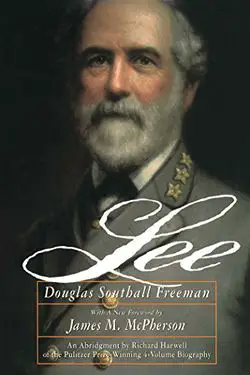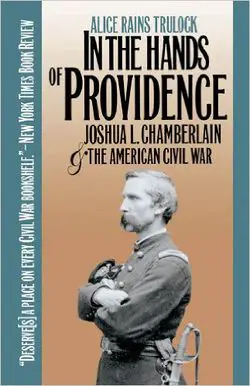Difference between revisions of "American Civil War Biographies Top Ten Booklist"
Costello65 (talk | contribs) (Created page with "{{Mediawiki:kindleoasis}} File:leecover.jpg|thumbnail|275|px|<i>[https://smile.amazon.com/Lee-Douglas-Southall-Freeman-ebook/dp/B001D1UO7Y/ref=sr_1_1?s=books&ie=UTF8&qid=147...") |
Costello65 (talk | contribs) |
||
| Line 1: | Line 1: | ||
{{Mediawiki:kindleoasis}} | {{Mediawiki:kindleoasis}} | ||
| − | [[File:leecover.jpg|thumbnail| | + | [[File:leecover.jpg|thumbnail|250px|]] |
On April 9, 1865, Robert E. Lee surrender his Army of Northern Virginia to Union General Ulysses S. Grant at Appomattox Courthouse, effectively ending the American Civil War. The four years of bloody carnage forever altered the course of the nation. Perhaps the pivotal period in American History, the Civil War was led by some of the most renowned figures in American History. | On April 9, 1865, Robert E. Lee surrender his Army of Northern Virginia to Union General Ulysses S. Grant at Appomattox Courthouse, effectively ending the American Civil War. The four years of bloody carnage forever altered the course of the nation. Perhaps the pivotal period in American History, the Civil War was led by some of the most renowned figures in American History. | ||
| Line 6: | Line 6: | ||
=== Top Ten === | === Top Ten === | ||
| + | 1. Douglas Southall Freeman, ''Lee,''edited by Richard Harwell, abridged edition (New York: Scribner, 1997). | ||
| + | This abridged version, masterfully edited by Richard Harwell, in no less brilliant than Freeman’s 1934 four edition masterpiece. Through meticulous research and an easy writing style, the author introduces Lee to the reader as a nuanced and complicated leader. The events and regrets of his early life offer a great deal of insight into the mind of this brilliant tactician, inspired leader, and complex man. This is the standard by which all other accounts of Lee’s life are measured. | ||
| + | |||
| + | 2. Ronald C. White, ''American Ulysses: A Life of Ulysses S. Grant'' (New York: Random House, 2016). | ||
| + | This newly released account of Grant deserves a place in any Civil War library. White admirably accepts the challenge of defending Grant through painstaking research into the events that led to the often unfounded denigration of the general. In this flowing narrative, Grant is never glamourized, rather he is humanized as a flawed man. Too often, historical figures are either completely romanticized or vilified; this is not the case with this fascinating look into the life of a floundering cadet, failed businessman, leader of the Union Army, and President of the United States. Like his subject, White runs the gamut and dares to debunk myths, thereby causing one to reconsider Ulysses S. Grant. | ||
| + | [[File:handsofprov.jpg|thumbnail|250px|]] | ||
| + | 3. Alice Rains Turlock, ''In the Hands of Providence: Joshua L. Chamberlain and the American Civil War'' (Chapel Hill: University of North Carolina Press, 1992). | ||
| + | Joshua Lawrence Chamberlain led a fascinating and exemplary life. This scholar turned soldier achieved much throughout the course of his life, he is; however, most remembered for his heroics on the crest of Little Round Top during the Battle of Gettysburg. This unlikely soldier truly was a hero on the July afternoon in 1863. His education and natural intelligence made him an officer; his grit and tactical understanding made him a soldier. Turlock weaves her exhaustive research into a sinuous narrative that reads like a novel. Overflowing with historical facts and personal events, this brilliant text is the definitive biography of an extraordinary man. | ||
| + | |||
| + | 4. Terry Alford, ''Fortunes Fool: The Life of John Wilkes Booth''(New York: Oxford University Press, 2015). | ||
Revision as of 19:04, 4 November 2016
On April 9, 1865, Robert E. Lee surrender his Army of Northern Virginia to Union General Ulysses S. Grant at Appomattox Courthouse, effectively ending the American Civil War. The four years of bloody carnage forever altered the course of the nation. Perhaps the pivotal period in American History, the Civil War was led by some of the most renowned figures in American History.
The library of texts pertaining to the Civil War Era range from scholarly research to pure fiction. Some of the most informative works come in the biography genre. The countless memoirs and autobiographies are essential to professional researchers and historians and have proved indispensable to the modern biographer. Cohesively combining letters, memoirs, reports, and oral histories is a monumental task for the biographer; yet when successfully completed, a Civil War biography brings the 19th century legends to life. Below is our list of the biographies essential to library of any student of the Civil War.
Top Ten
1. Douglas Southall Freeman, Lee,edited by Richard Harwell, abridged edition (New York: Scribner, 1997). This abridged version, masterfully edited by Richard Harwell, in no less brilliant than Freeman’s 1934 four edition masterpiece. Through meticulous research and an easy writing style, the author introduces Lee to the reader as a nuanced and complicated leader. The events and regrets of his early life offer a great deal of insight into the mind of this brilliant tactician, inspired leader, and complex man. This is the standard by which all other accounts of Lee’s life are measured.
2. Ronald C. White, American Ulysses: A Life of Ulysses S. Grant (New York: Random House, 2016). This newly released account of Grant deserves a place in any Civil War library. White admirably accepts the challenge of defending Grant through painstaking research into the events that led to the often unfounded denigration of the general. In this flowing narrative, Grant is never glamourized, rather he is humanized as a flawed man. Too often, historical figures are either completely romanticized or vilified; this is not the case with this fascinating look into the life of a floundering cadet, failed businessman, leader of the Union Army, and President of the United States. Like his subject, White runs the gamut and dares to debunk myths, thereby causing one to reconsider Ulysses S. Grant.
3. Alice Rains Turlock, In the Hands of Providence: Joshua L. Chamberlain and the American Civil War (Chapel Hill: University of North Carolina Press, 1992). Joshua Lawrence Chamberlain led a fascinating and exemplary life. This scholar turned soldier achieved much throughout the course of his life, he is; however, most remembered for his heroics on the crest of Little Round Top during the Battle of Gettysburg. This unlikely soldier truly was a hero on the July afternoon in 1863. His education and natural intelligence made him an officer; his grit and tactical understanding made him a soldier. Turlock weaves her exhaustive research into a sinuous narrative that reads like a novel. Overflowing with historical facts and personal events, this brilliant text is the definitive biography of an extraordinary man.
4. Terry Alford, Fortunes Fool: The Life of John Wilkes Booth(New York: Oxford University Press, 2015).

